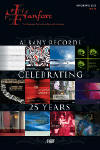Texte paru dans: / Appeared in:

Fanfare Magazine: 36:4 (03-04/2013)
Pour
s'abonner / Subscription information
Les abonnés à Fanfare Magazine ont accès aux archives du
magazine sur internet.
Subscribers to Fanfare Magazine have access to the archives of the magazine
on the net.
Code-barres / Barcode : 0093046755560 (ID288)
This program consists of works dating from the Renaissance except for John McCabe’s setting of a text used earlier by Wiliam Cornysh (the younger, died 1523). The texts of these works follow the progression of events from Palm Sunday to Easter Sunday. The seventh program in this group’s series of recordings displays the same superb tuning, dynamic range, and interpretive insight as its predecessors. The English composers who have dominated their repertoire until now are joined here by three Flemish and three Spanish composers, broadening the stylistic range within the frame of Renaissance polyphony. John McCabe’s Woefully arrayed, composed for this ensemble and the longest work in the program, stands out clearly identifiable in this company, yet McCabe’s contemporary reflection of the style fits comfortably into the program. Other early-music ensembles have similarly commissioned contemporary composers whose work is more jarring than this in its juxtaposition with the music of the past. I find his work gratifying. While McCabe correctly refers to his predecessor as “William Cornysh, Junior,” the other notes refer to him as a composer also represented in the Eton Choirbook, but that was another composer, possibly this man’s father, who died in 1502. Indeed, the British national catalog combines the two under one entry, as Peter Phillips did in a full disc devoted in effect to both composers. Recent issues of the elder Cornysh by Andrew Carwood and Stephen Darlington follow the current scholarship.
An example of Stile Antico’s excellence is Victoria’s motet O vos omnes, which concludes with the most exquisite fade into silence at the end on “any sorrow like unto my sorrow.” Andrew Hope’s version on Gaudeamus with one voice to a part is also fine. One of the most familiar pieces on this disc is Orlando Gibbons’s Hosanna to the Son of David, which contrasts with the choral performances currently available, but Jeremy Summerly’s version (20:2) is similar to this. John Taverner’s Dum transisset sabbatum (I), the longer of his two anthems, is exquisite, fully equal to the best current versions under David Skinner (35:4), Harry Christophers (15:4), and Peter Phillips (19:3). Lhéritier’s Surrexit pastor bonus is on Jeremy Summerly’s fine Renaissance collection (18:3). Crecquillon’s Congratulamini mihi is on a Brabant Ensemble disc (30:2), and also on an Andrew Carwood disc with Francisco Guerrero’s Maria Magdalene (34:3). The story of the Passion and Resurrection, as the title promises, unfolds here in a broad range of Renaissance settings, quite unlike any other program on disc. The competition across a variety of discs is impressive, but on its own terms this is a marvelous offering.
Cliquez l'un ou l'autre
bouton pour découvrir bien d'autres critiques de CD
Click either button for many other reviews



